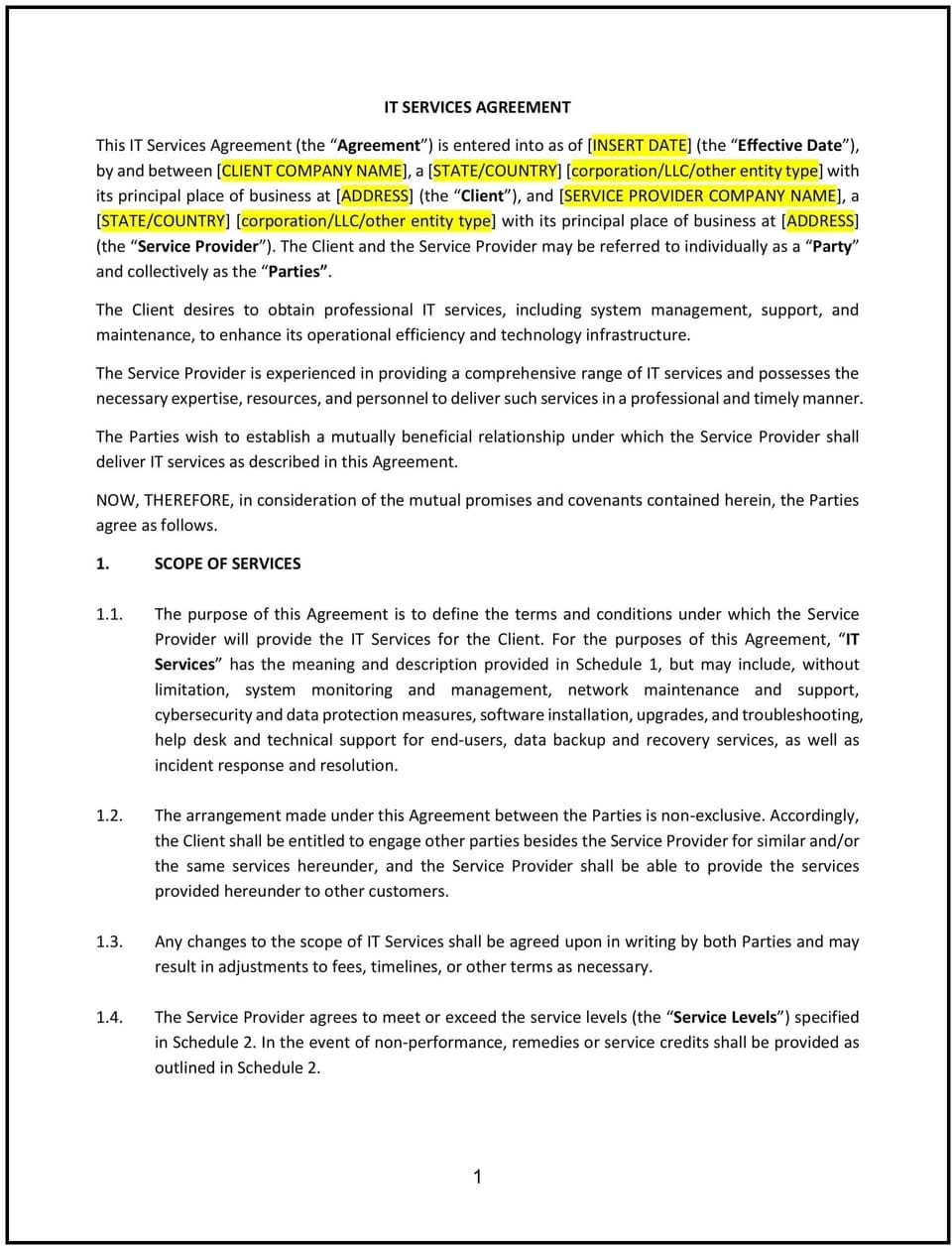IT Services Agreement (Nebraska): Free template

IT Services Agreement (Nebraska)
An IT Services Agreement is a contract between a service provider and a client that outlines the terms and conditions for delivering IT-related services, such as software development, network management, or technical support. In Nebraska, these agreements are widely used across industries like agriculture, healthcare, and manufacturing, where reliable IT infrastructure is critical for operations.
Nebraska’s legal framework, including the Nebraska Uniform Commercial Code (UCC) and consumer protection laws, ensures that IT Services Agreements are enforceable when properly drafted. For example, an Omaha-based healthcare provider might use an IT Services Agreement to outsource its electronic medical records management, ensuring compliance with state-specific regulations and industry standards.
Tips for drafting and maintaining an IT Services Agreement in Nebraska
- Define the scope of services: Clearly outline the IT services to be provided, such as software installation, network maintenance, or cybersecurity support.
- Example: “The Provider agrees to deliver monthly network maintenance and 24/7 technical support for the Client’s operations.”
- Include payment terms: Specify the payment structure, whether hourly, fixed-fee, or project-based, and include invoicing and payment deadlines.
- Example: “The Client agrees to pay the Provider $150 per hour for services rendered, with invoices due within 30 days of receipt.”
- Address data privacy and security: Ensure the agreement complies with Nebraska’s data protection laws and includes provisions for safeguarding sensitive information.
- Example: “The Provider agrees to implement industry-standard security measures to protect the Client’s data from unauthorized access.”
- Set performance metrics: Define measurable goals, such as system uptime or response times, to ensure the Provider meets the Client’s expectations.
- Example: “The Provider guarantees 99.9% system uptime and a maximum response time of two hours for critical issues.”
- Include termination clauses: Specify the conditions under which either party can terminate the agreement, such as breach of contract or failure to meet performance standards.
- Example: “Either party may terminate this agreement with 30 days’ written notice if the other party fails to fulfill its obligations.”
- Align with Nebraska laws: Ensure the agreement adheres to Nebraska’s UCC and other relevant regulations, particularly for contracts involving the sale of goods or services.
- Example: “This agreement shall be governed by and construed in accordance with the laws of the State of Nebraska.”
Frequently asked questions (FAQs)
Q: Is an IT Services Agreement enforceable in Nebraska?
A: Yes, as long as the agreement is clear, reasonable, and complies with Nebraska contract laws, it is legally enforceable.
Q: What industries commonly use IT Services Agreements in Nebraska?
A: Industries such as agriculture, healthcare, manufacturing, and technology frequently use IT Services Agreements in Nebraska to manage their IT infrastructure and operations.
Q: Can an IT Services Agreement be customized for specific needs?
A: Absolutely. The agreement should be tailored to the specific services, performance expectations, and legal requirements of the parties involved.
Q: How can disputes over an IT Services Agreement be resolved in Nebraska?
A: Disputes can often be resolved through negotiation or mediation. If necessary, they may be resolved in court or through arbitration, depending on the terms specified in the agreement.
Q: Does Nebraska have specific data privacy laws that affect IT Services Agreements?
A: While Nebraska does not have a comprehensive data privacy law, businesses must comply with federal regulations and industry standards for data protection.
This article contains general legal information and does not contain legal advice. Cobrief is not a law firm or a substitute for an attorney or law firm. The law is complex and changes often. For legal advice, please ask a lawyer.


